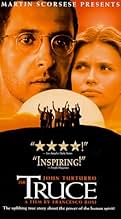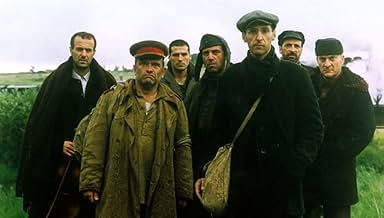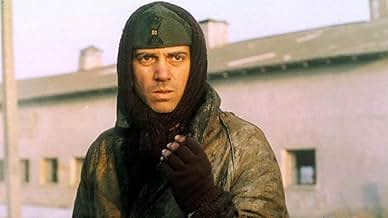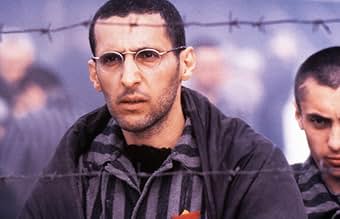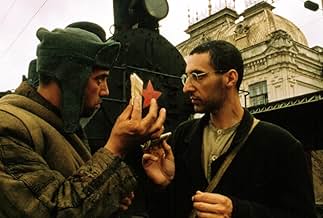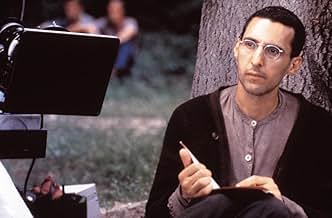CALIFICACIÓN DE IMDb
6.6/10
1.9 k
TU CALIFICACIÓN
Sigue autobiográfica "The Reawakening" de Primo Levi.Sigue autobiográfica "The Reawakening" de Primo Levi.Sigue autobiográfica "The Reawakening" de Primo Levi.
- Dirección
- Guionistas
- Elenco
- Premios
- 7 premios ganados y 9 nominaciones en total
Tatyana Cherkasova
- Irina
- (as Tatyana Meshcherina)
Opiniones destacadas
The Truce is a great movie. Even if this is not your type of movie that you would want to see, the story in itself is terrific. The story of post-holocaust, the close of the 2nd World War in Europe and the prime of Stalin in command is the setting of the movie. The actors bring out the greatness of the story with their colorful and realistic characters. This story, of a kind of Italian band of brothers, trying to get back home is the plot to one of the best movies dealing with redemption in 1945 Europe. Agnieszka Wagner is down right stunning. Although she plays a simple role, it is moments like these, with her on camera that make the movie good. The entire movie is packed with moments of laughter, horror, sweetness and truth. The Truce is a forgotten classic of its genre.
I suppose everyone has seen one or more film representations of The Holocaust, but this one is different. It focuses not on the horror of the events themselves, rather, it's main thrust is struggle to return from the nightmare.
I liked the film for its apparent accuracy in location and the detail of what it was like for some of the Jews liberated from Auschwitz to find their way back to their homelands. Virtually helpless, the Jews in Primo Levi's autobiography embark on an odyssey that eventually gets them back to their homes -- at least some of them. All the more surprising is that Stalin's Soviet Union is their main benefactor throughout all of this. While this is supposed to be an autobiography, I have to wonder at some of the scenes, for example, when the train load of Jews arrives at the Munich main rail station, a former Werhmacht soldier kneels before them. In another, a Jew with barely enough food for himself, gives some bread to German POWs in Russia so that he can watch them fight over it. The irony is unmistakable.
Overall, I liked the film. It's one you have to see more than once because of all the detail. It's a bit difficult to follow the dialog in part, because much of it is in the language of the people who are represented: Poles, Russians, Ukrainians, French, Germans, Italians. Not only that, but the English dialog is accented and somewhat difficult to follow.
I intend to see it at least one or two more times in order to get the full effect of this very well done story.
I liked the film for its apparent accuracy in location and the detail of what it was like for some of the Jews liberated from Auschwitz to find their way back to their homelands. Virtually helpless, the Jews in Primo Levi's autobiography embark on an odyssey that eventually gets them back to their homes -- at least some of them. All the more surprising is that Stalin's Soviet Union is their main benefactor throughout all of this. While this is supposed to be an autobiography, I have to wonder at some of the scenes, for example, when the train load of Jews arrives at the Munich main rail station, a former Werhmacht soldier kneels before them. In another, a Jew with barely enough food for himself, gives some bread to German POWs in Russia so that he can watch them fight over it. The irony is unmistakable.
Overall, I liked the film. It's one you have to see more than once because of all the detail. It's a bit difficult to follow the dialog in part, because much of it is in the language of the people who are represented: Poles, Russians, Ukrainians, French, Germans, Italians. Not only that, but the English dialog is accented and somewhat difficult to follow.
I intend to see it at least one or two more times in order to get the full effect of this very well done story.
I have read "Se questo è un uomo" 15 times, and I also consider "La Tregua" as one of the most extraordinary Odysseys of our times. I can hardly find any of Levi's masterpieces in this hodgepodge of episodes, hardly connected to each other and with barely any historical explanation of the events. Several comments about god and religion reported in the movie were not even present in the book, giving the impression that the director wanted to twist Levi's thought to serve his own philosophical agenda. The movie relies too much on images and too little on Levi's own considerations. Some effort has been put in trying to represent the chaotic world of those times, but I would have appreciated less scenic representation and more intimate comments.
This movie is based on the true events that took place in one of the most renowned Auschwitz prisoners Primo Levi. More specifically, it is the last book of his experiences, whereby this book starts at the moment that Auschwitz is liberated, i.e. As end of january 1945. It describes his experiences he had during his travels in the soviet liberated part of the former Nazi empire.
Note: for the people that have never heard of "Is this a Man" - which describes his experiences in Auschwitz - one of the most impressive books that I have ever read.
With great acting and stunning scenes it is an altogether convincing image of how the situation may have been in the period up to the end of the war. It does not show the continuous women abuse that was ongoing during those times, but it shows that hunger and food were a day to day battle.
Overall, this movie deserves a score of 7.4 / 10, resulting in a very well earnt 7 star IMDb rating. I am personally surprised by the fact that this movie is not more known.
Note: for the people that have never heard of "Is this a Man" - which describes his experiences in Auschwitz - one of the most impressive books that I have ever read.
With great acting and stunning scenes it is an altogether convincing image of how the situation may have been in the period up to the end of the war. It does not show the continuous women abuse that was ongoing during those times, but it shows that hunger and food were a day to day battle.
Overall, this movie deserves a score of 7.4 / 10, resulting in a very well earnt 7 star IMDb rating. I am personally surprised by the fact that this movie is not more known.
The movie which held great promise seemed to stop short of coherency. The dialog was hard to understand and the characters never really were fully developed. Some things should be left alone as books. This was one of them.
The broad scope of the book could not be shown and the internal thought processes simply did not make the transition.
The broad scope of the book could not be shown and the internal thought processes simply did not make the transition.
¿Sabías que…?
- TriviaFinal film written and directed by Francesco Rosi.
- Citas
[last lines]
Primo Levi: [narrating] You who live secure in your warm houses, who return at evening to find hot food and friendly faces. Consider if this is a man who labors in the mud, who knows no peace, who fights for a crust of bread, who dies at a yes or a no. Meditate that this took place.
- ConexionesFeatured in The Movie Show: Episode dated 19 October 1997 (1997)
- Bandas sonorasMadonina
Written by Giovanni D'Anzi (as G. D'Anzi)
Selecciones populares
Inicia sesión para calificar y agrega a la lista de videos para obtener recomendaciones personalizadas
- How long is The Truce?Con tecnología de Alexa
Detalles
- Fecha de lanzamiento
- Países de origen
- Idiomas
- También se conoce como
- The Truce
- Locaciones de filmación
- Productoras
- Ver más créditos de la compañía en IMDbPro
Taquilla
- Total en EE. UU. y Canadá
- USD 71,448
- Fin de semana de estreno en EE. UU. y Canadá
- USD 23,165
- 26 abr 1998
- Tiempo de ejecución
- 2h 5min(125 min)
- Color
- Mezcla de sonido
- Relación de aspecto
- 1.85 : 1
Contribuir a esta página
Sugiere una edición o agrega el contenido que falta

